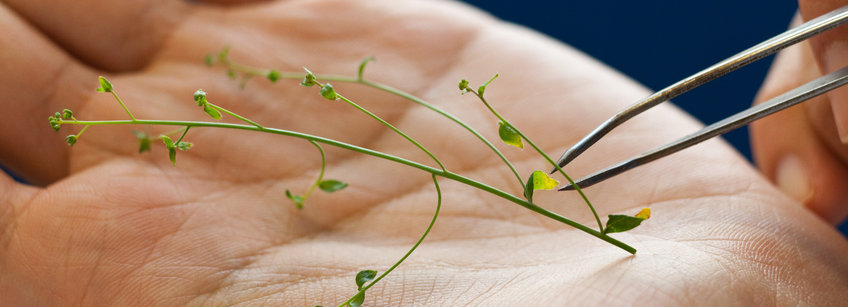Molecular Biology - Detlef Weigel
There is tremendous phenotypic diversity between and within species. Much of this is thought to reflect adaptation to the environment. Drawing on tools from high-throughput genomics to forward genetics, we are investigating the mechanisms responsible for adaptive variation.
The long-term goal of our research is to understand how adaptive traits evolve and what the underlying molecular mechanisms are. To this end, we are using both phenotype- and genotype-driven approaches to identify genetic and epigenetic variants with a potential role in local, regional, or global adaptation. Such studies have benefitted from knowledge about the genomes of other species, as well from a historical perspective that exploits ancient DNA methods to unlock the knowledge stored in herbaria. One of our lines of research, on the interaction of plants with microbial communities in the field, is being supported through a Synergy grant from the ERC. You can read the grant proposal here.
Apart from scientific discoveries, training the next generation of leaders is very important to us. Many former members have established successful careers in a variety of areas, including academia, foundations, and small and large biotech companies, and several have won major scientific prizes and awards. There is a range of exciting opportunities to perform cutting-edge work in the department, and we are always interested in hearing from undergraduates, prospective doctoral researchers and postdocs who want to be part of our team.
More details on our research can be found on the departmental web site.
Press releases & research news
The research uses genomic data to understand this keystone species’ genetic health and adaptability, help reconstruct its demographic history, and assess the long-term impacts of human interaction on forest ecosystems. The findings emphasise the need for conservation strategies to consider both ecological and anthropogenic factors.
more
Mariam Coulibaly has been a guest scientist at the Max Planck Institute for Biology Tübingen, in the Department of Molecular Biology, for 3 months. We discussed her enthusiasm for promoting indigenous crops, such as Kersting’s groundnut or groundbean (
Macrotyloma geocarpum), cultivated in West Africa. Her research focuses on the crop’s genetic improvement. She discusses her PhD thesis in Benin no exploring the species, her ongoing promotion efforts, and the advantages of collaboration in enhancing resource access.
more
Ruth Ley, Detlef Weigel and Postdoc William “Tony” Walters are once again among Clarivate’s ranking of the top 1% by citations in their respective fields on the Web of Science™. For the past ten years, Ruth Ley, Director of the Department of Microbiome Science, and Detlef Weigel, Director of the Department of Molecular Biology, have been recognised as recipients of the Highly Cited Researcher Award. For William Anthony Walters “Tony”, a postdoc in the Department of Microbiome Science, this will be his fourth consecutive year to receive this recognition.
more
The African Plant Genomics Symposium is an eagerly awaited event to be held in Nairobi, Kenya, in 2025, with the aim of building a network, supporting a unified agenda for plant genomics in Africa, and launching the Africa Plant Genomics Society. Scientists and organisations working with African plants are invited to share their perspectives and strategies for research, and build a network that supports the continent’s plant genomics research.
more
A collaborative effort between Dr. Ulrich Lutz from the Max Planck Institute for Biology Tübingen and Dr. Yogesh Parmessur from the Mauritius Sugar Industry Research Institute (MSIRI) has led to a significant breakthrough in combating herbicide-resistant weeds that are threatening sugarcane and vegetable cultivation in Mauritius. This inspiring joint effort focused on using a newly developed Nanopore-based sequencing method to allow for rapid, on-site, cost-effective detection of herbicide resistance in weeds.
more





